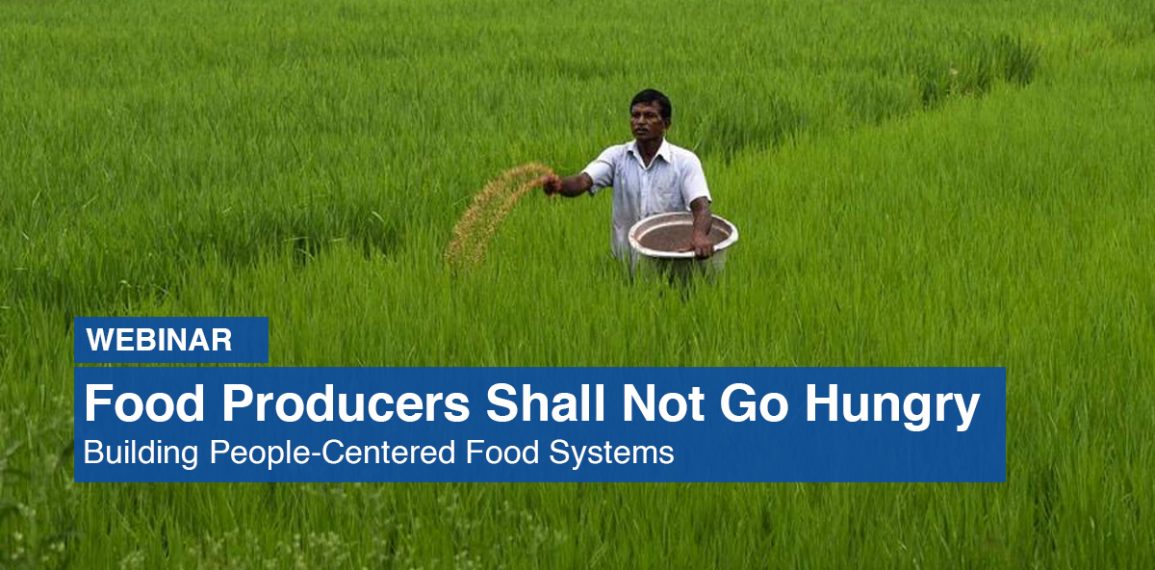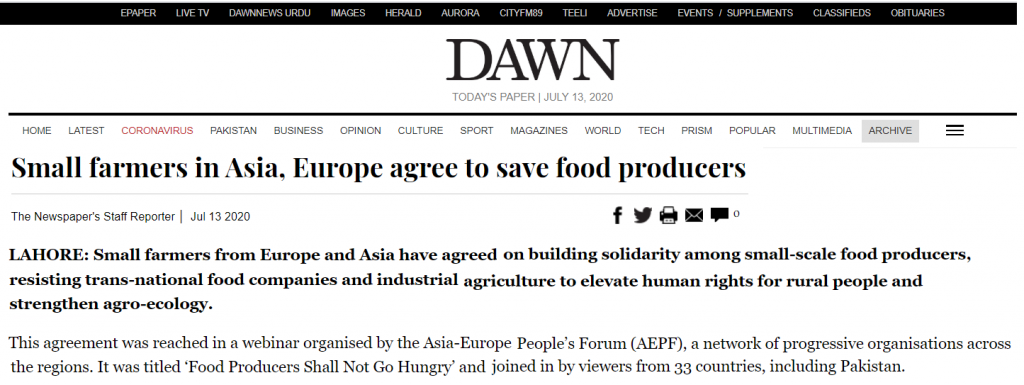Webinar: Food Producers Shall Not Go Hungry - Building People-Centered Food Systems
Watch the Complete Webinar:
This Webinar was also covered on Dawn: Pakistan’s oldest, leading and most widely read English-language newspaper.
Webinar Report
“Strengthening solidarity among European and Asian farmers movements is key to survival of peasants hard hit by COVID-19. No one should go hungry, including food producers.” Paula Gioia, leader La Via Campesina – Europe
The Asia Europe People’s Forum, a network of progressive organisations across our regions, held its second webinar of a two-part series “Food Producers Shall Not Go Hungry”.
This all-female panel was comprised of peasant and rural workers speaking from The Philippines, India, Romania and Germany. The speakers included Filipino peasant organizer of PKKK, Amparo Miciano, organizer of Karnataka Rajya Raitha Sangha in India, India, Chukki Nanjundaswamy, worker of Ecoruralis in Romania, Ramona Duminicioiu and peasant organizer in Germany, Paula Gioia.
The insightful discussion covered the struggles of communities, particularly female food producers, for building people-centered food systems.
Paula Gioia from La Via Compisena Europe explained how the coronavirus pandemic proved that peasant agriculture can feed local populations with fresh, healthy food that doesn’t depend on long supply chains. In this context, much of society is realising the importance of localized, decentralised food systems, as well as of acknowledging the essential work of food producers. She said that strengthening solidarity among European and Asian farmers movements is key to the survival of peasants hard hit by COVID-19. “No one should go hungry, including food producers”, she said. She shared that more than 90 percent of farms in Europe are small, that the peasantry has been feeding people before, and that COVID19 lockdowns shortening supply chains led to local communities contributing labour, and farmers making direct sales through Community Supported Agriculture, direct sales, small shops and food boxes.
The pandemic showed the ugly face of the European food industry, deepening the historical exploitation of migrant seasonal workers, while at the same time turning supermarkets into Coronavirus transmission hotspots. Farmers markets and CSAs are simply much safer ways for people to get nutritious food. It is also important to understand that epidemics like COVID19 are direct products of the industrial agrifood systems.
Ramona Duminicioiu, a Romanian peasant of Ecoruralis, explained that as governments failed to coordinate with one another, there was a deepening fear by people that they would have to fend for themselves. Supermarkets that remained open did price gouging, while banks took advantage of poor countries unable to cope with the virus. She said that in Europe “governments haven’t responded to our demands. Everything migrant workers managed to do is due to themselves, their own hard work, and the solidarity of others… Yet our role in addressing the crisis became visible. Governments had to recognize our role as essential workers”. Ramona went on, “we produce food under very difficult conditions. Until now peasants and workers have received no support from governments. We survive because consumers recognise our contributions, but we still are forced to compete with powerful transnational companies for policy plus financial support.”
Amparo Miciano, a central organizer of PKKK, a rural women’s network in The Philippines, stressed, “We believe we have the capacity to feed ourselves, especially if we are guaranteed control over the resources and technology require to produce food. Hence, we continue to assert our rights for land and water resources, we assert agroecology as a suitable way in farming and protecting our environment.” Amparo further argued that PKKK female food producers struggle to be recognised as farmers. Their work involves combining the crucial care work with food provision, where rural peoples barter with each other and fed people, which govts and corporations have failed to do.
According to Chukki Nanjundaswamy, from Karnataka Rajya Raitha Sangha in Karnakata, “Farmers are also getting organised and consumers also getting organised. We’re seeing initiatives. The 61 days of lockdown we saw in India was enough to show that the capitalist model is a failed model. Capitalist model just collapsed in our countries. What worked was a people to people initiative. What worked was solidarity between the people. These are the times of crisis and also the times of opportunities…. This situation taught the lesson that it’s better to grow diversified fruit for the local market. Those growing monocultures to sell at far away markets were hit the hardest. Those who did agroecological farming were able to build their own markets and sell directly.”
She said, “Lockdown period revealed to us that Capitalism is a failed system. A solidarity economy driven by people-to-people initiatives is what worked in this period”. The lockdown showed the capitalist model does not work for the majority, as many peasants died of malnutrition, poor health and debt-induced suicide during this time. It is people-to-people support that is helping the majority to survive the COVID19 crisis.
The viewers agreed that we must build solidarity with small scale food producers, organize against authoritarianism, resist transnational companies and industrial agriculture, amplify workers’ voices, elevate human rights for rural peoples, strengthen agroecological farming and organise for food sovereignty.
Viewers engaged in a question and answer session, facilitated by Farooq Tariq of the Pakistan Kissan Rabta Committee and Yinfang Tang from Fian International. This webinar was viewed by over 1300 people on Facebook in just the first few hours since the Livestream on Friday afternoon, showing a great deal of interest about the question of food and peasants beyond the over 200 viewers who registered and participated in the Zoom session from 33 different countries, with Live translations into Urdu and Bahasa. By the end of the weekend, the panel was viewed by approximately 2000 people.
Farooq Tariq
General Secretary Pakistan Kissan Rabita Committee
+92 03008411945




